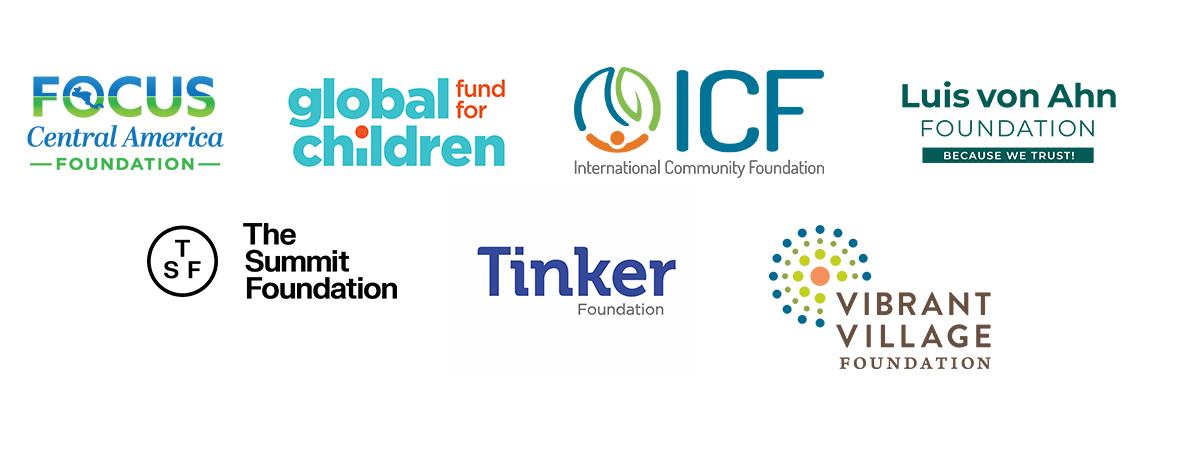Central America funders launch initiative to strengthen civil society for post-pandemic educational recovery
 Seven philanthropic organizations have joined forces to promote the recovery of education systems in Guatemala and Honduras.
Seven philanthropic organizations have joined forces to promote the recovery of education systems in Guatemala and Honduras.
December 7, 2022 – WASHINGTON, DC – Almost three years into the COVID-19 pandemic, the slow return to full-time in-person classes has left millions of children and young people in Central America with limited access to quality education and all the services and support that come with it.
Today, seven funders are announcing a new initiative called RECARGA – Recuperando la Educación en Centroamérica: Activando Redes y Grupos Asociados (Educational Recovery in Central America: Supporting the Critical Role of Civil Society). This joint commitment of $1.5 million over three years will support local organizations to complement public education systems through innovation and technical leadership; by directly filling gaps to broaden inclusion; by providing wrap-around support to students; and by advocating for expanded access to quality education for all children.
While affirming that education is a basic right for all children and primarily the responsibility of governments, these seven funders – Tinker Foundation, The Summit Foundation, Global Fund for Children (GFC), International Community Foundation, Luis von Ahn Foundation, Focus Central America, and Vibrant Village Foundation – share the understanding that local civil society organizations play a wide range of key roles in supporting education, particularly in the aftermath of crises.
“By joining the RECARGA initiative, we are leveraging our partners’ wisdom and resources, mitigating the burden on the local organizations, and ensuring longer-term impact on the educational outcomes of Central America,” said Eliza Brennan, Senior Program Officer for Education and Migration at International Community Foundation.
Data on the pandemic’s impacts on education, while still sparse, are alarming. The Ministry of Education in Guatemala recorded a 71% increase in dropout rates in 2021, and the Honduran government estimates that, due to the slower pace of learning during the global health crisis, it will take seven years to reach reading milestones normally taught in two and 11 years for students to acquire basic math competencies. Emerging evidence suggests that the most damaging outcomes – social disconnection, learning loss, and dropouts – are concentrated among students who already faced significant barriers to educational access, including girls, Indigenous students, and children in rural areas.
Beginning in January 2023, RECARGA will convene and fund a cohort of 12 civil society organizations in Guatemala and Honduras that are working to ensure all children and young people can exercise their right to education. Each participating organization will receive three years of funding and organizational capacity strengthening support to continue its education-related work, with a particular emphasis on increasing organizational influence and impact beyond direct service delivery. As a collective, the cohort will convene regularly to exchange information and approaches; articulate and advance shared priorities; engage with experts and stakeholders; and participate in capacity-strengthening activities.
“GFC will facilitate these activities, but the local organizations will define the cohort’s priorities, practices, and future directions,” said Kimberly McClain, Regional Co-Director for the Americas at GFC. “This initiative empowers local organizations as representatives of their constituents and strengthens their leadership and voice in public and policy spaces.”
In Guatemala, the Population Council will also provide RECARGA partners with opportunities to engage in research, hands-on skills-building, and collaborative learning to cultivate a shared vision for equitable educational recovery. The Population Council has a long history of improving educational prospects for the most marginalized youth, particularly for Indigenous girls who have long lacked equitable opportunities for learning.
“We believe community-based organizations can and should play a decisive role in the ongoing recovery of education in Central America. Because they focus on the children most likely to be left out and left behind, these organizations have essential perspectives to offer on how educational systems can improve and evolve moving forward,” said Caroline Kronley, President of Tinker Foundation.
This donor collaborative, which grew out of conversations at the annual Central America Donors Forum, aligns with a broader effort to shift power in philanthropy and foster trust-based funder-grantee relationships. Donors developed a set of norms and signed onto a shared agreement about how they would participate in the collaborative in ways that will create space for local partners’ leadership to thrive.
“As funders of RECARGA, the COVID-19 crisis has shown us that our collective response must be driven by trust in civil society partners who work in the areas hit hardest by the virus and its impacts. It is our responsibility to support these organizations and provide them with the resources they need to promote the recovery of local educational systems,” said Rodrigo Barillas, Executive Director of the Luis von Ahn Foundation.
RECARGA is open to new members who wish to contribute to the pooled grant fund and participate in learning through the initiative.
The RECARGA initiative is managed by GFC, which provides direct support to local organizations and facilitates networking, convening, and collaboration in Guatemala and Honduras.